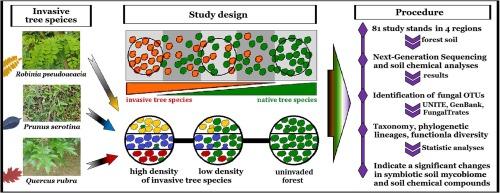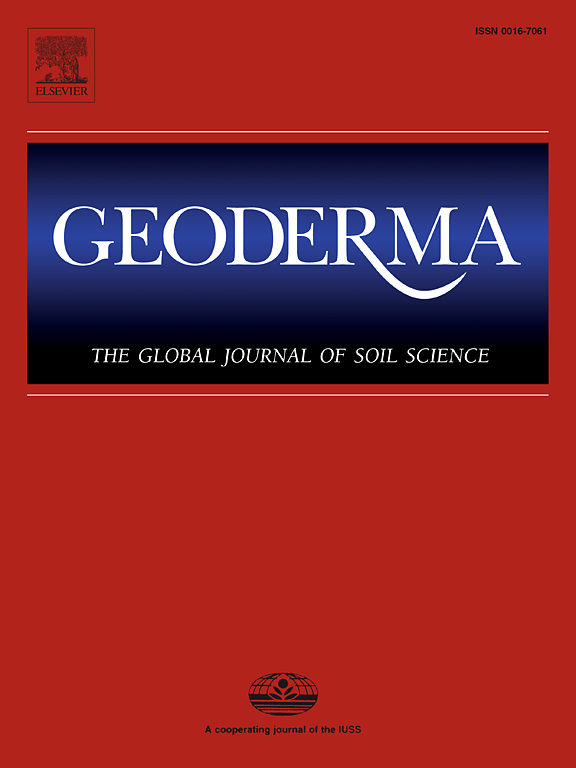外来入侵树种对中欧以松树为主的森林生态系统中共生土壤真菌群落的影响
IF 5.6
1区 农林科学
Q1 SOIL SCIENCE
引用次数: 0
摘要
生物入侵是对自然保护和可持续森林管理的严重威胁。入侵树木会减少生物多样性,改变养分循环,并将本地森林转变为由入侵者决定的新生态系统。几乎所有欧洲树木都与真菌形成外生菌根(ECM)共生关系,这对树木的生长发育至关重要。我们的目的是确定广泛分布的外来树种刺槐(寄生丛枝菌根(AM)真菌)、樱桃(形成 AM 复合体并可能形成 ECM 共生)和红枹(ECM 主导,可形成 AM 复合体)的入侵如何影响土壤中的共生真菌。我们在波兰西部以松树为主的森林中,沿着入侵树种密度递增的梯度采集了81个林分的土壤样本,通过真菌条形码区域ITS2 rDNA的高通量测序鉴定真菌。刺槐的负面影响最大,几乎消除了土壤中的 ECM 真菌。在土壤化合物中,N-NO3 和 N-NH4 对 ECM 真菌群落的多样性和类群组成有显著影响。与其他地方未受侵染的松林相比,R. pseudoacacia 附近未受侵染的松林的 ECM 真菌丰富度和丰度明显较低,而 N-NO3 浓度则高出数倍。这表明,刺槐的负面影响超出了含有刺槐的林分,影响到周围的森林。刺槐对 ECM 分类群的丰度有显著的负面影响,但对 ECM 分类群的丰富度和多样性指数没有影响,而红枹则提高了 ECM 真菌的丰度和丰富度,但对多样性指数没有显著影响。本文章由计算机程序翻译,如有差异,请以英文原文为准。

Impact of invasive alien tree species on symbiotic soil fungal communities in pine-dominated forest ecosystems in central Europe
Biological invasions are a serious threat to nature conservation and sustainable forest management. Invasive trees can reduce biodiversity, modify nutrient cycles and transform native forests into novel ecosystems determined by invaders. Almost all European trees form ectomycorrhizal (ECM) symbiosis with fungi, which is crucial for tree development. However, the impact of invasive trees on ECM fungi in native forests has scarcely been studied.
We aimed to determine how an invasion of the widespread alien trees Robinia pseudoacacia (which hosts arbuscular mycorrhizal (AM) fungi), Prunus serotina (which forms AM associations and potentially can ECM symbiosis), and Quercus rubra (ECM-dominated, can form AM associations) influences symbiotic fungi in soil. We collected soil samples along a gradient of increasing density of invasive species in 81 stands in pine-dominated forests in Western Poland, identifying fungi through high-throughput sequencing of the ITS2 rDNA, a barcode region for fungi. Each invasive tree was examined independently.
Robinia pseudoacacia had the strongest negative impact, almost eliminating ECM fungi from the soil. Among soil compounds, N-NO3 and N-NH4 significantly influenced diversity and taxa composition of ECM fungal communities. Uninvaded pine stands near R. pseudoacacia had significantly lower richness and abundance of ECM fungi, and several-fold higher N-NO3 concentrations, than uninvaded stands elsewhere. That indicates, that the negative impact of Robinia trees extends beyond stands containing Robinia to influence surrounding forests. Prunus serotina had significant negative impact on ECM taxa abundance, but not on ECM taxa richness and diversity indices, while Quercus rubra enhanced the abundance and richness of ECM fungi, but had no significant influence on the diversity indices.
求助全文
通过发布文献求助,成功后即可免费获取论文全文。
去求助
来源期刊

Geoderma
农林科学-土壤科学
CiteScore
11.80
自引率
6.60%
发文量
597
审稿时长
58 days
期刊介绍:
Geoderma - the global journal of soil science - welcomes authors, readers and soil research from all parts of the world, encourages worldwide soil studies, and embraces all aspects of soil science and its associated pedagogy. The journal particularly welcomes interdisciplinary work focusing on dynamic soil processes and functions across space and time.
 求助内容:
求助内容: 应助结果提醒方式:
应助结果提醒方式:


